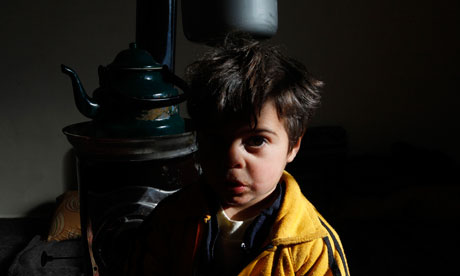
By Chris Doyle
The refugees were all crammed into a school. They were Lebanese. The children slept on threadbare mattresses in classrooms. Generous locals were bringing in supplies. This was Homs in 2006 and the families had been fleeing the Israeli bombing in Lebanon. Homs was once again playing host to Lebanese refugees, as it had done during much of the 15-year Lebanese civil war.
Fast forward to this January. I was surrounded by refugee children in an abandoned school but this time the roles were reversed. Lebanese were hosting people from Homs in the villages of Wadi Khaled, a mountainous region of north-east Lebanon.
Since last April, hundreds have crossed the border, fleeing the Assad regime’s oppression. By this month there were just over 7,000 UN-registered refugees in northern Lebanon, with thousands living unregistered in the hills and in Tripoli.
As the Syrian regime “cleansed” Bab Amr in Homs, another 2,000 to 3,000 fled across the border, joined by others following the Syrian army’s shelling of towns such as Al Qusayr near the border on 4 March.
The refugees had to walk for days in freezing conditions, evading landmines and regime forces who shelled one bridge used to cross into Lebanon at Qusayr.
They arrive traumatised by the horrors of what they left behind. Most families have lost loved ones and are terrified of going back. One refugee I met during my visit had had to be dragged injured by his friends across a minefield. Refugees from Tell Kalakh, close to the border, told me that their houses had either been taken over or destroyed since they left.
The effects on children have, as ever, been the most dramatic. In a run-down apartment in Tripoli, Ahmed, a four-year-old boy from Homs, came up to me and said: “All I can hear is the tanks firing outside my house.”
Historically, Syria, Lebanon and Jordan have all hosted refugee communities including Armenians, Palestinians and Iraqis. Lebanon was traditionally a haven for refugees from the region seeking the protection of its mountains – but no longer. Just ask the Palestinians who languish in appalling refugee camps.
The current Lebanese government is friendly with Damascus and does all it can to discourage Syrian refugees. They are not even recognised as refugees. The Lebanese politically correct phrase is “those fleeing the unrest”. The Lebanese president, Michel Suleiman, dismissed the issue last Thursday, saying: “The influx of some Syrian families as a result of the turbulence in Syrian does not constitute a major problem because they can stay with their relatives.”
This echoes Reem Haddad, the Syrian regime’s spokesperson, when she said about Syrians fleeing to Turkey: “It’s a bit like having a problem in your street, and your mum lives in the next street, so you go and visit your mum for a bit.”
The UN high commissioner for refugees has to operate quietly under the eye of Lebanese security. The Syrians cannot get jobs and are not allowed permits to travel around Lebanon. As yet, there is no question of establishing a refugee camp as in Turkey and Jordan. Many Syrians are critical of the UN, believing that they should do more. Many refugees are afraid to register, concerned that their details would be handed over to the Lebanese or Syrian security services.
Many of the latest refugees entered Lebanon through the Beka’a valley where they were stopped and searched by the Lebanese army. Around 30 to 40 have been arrested, according to Syrian activists. All this creates additional tension as the Beka’a is predominantly Shia and under Hezbollah control, while the refugees are nearly all Sunni.
Not all Lebanese are unwelcoming. The refugees in Wadi Khaled and Tripoli are largely housed by local families, even though the villages in this area are among the most deprived in Lebanon with high unemployment. The refugees I met shivered in unheated buildings, some without windows, but many of the latest arrivals are freezing inside tents. It may not get much warmer soon. A local saying warns: “Keep your biggest coals for March.”
Support for the refugees is broadly divided on sectarian political grounds. Lebanese Sunnis have largely rallied round to lend support, including former Lebanese prime minister Sa’ad al-Hariri’s Future Movement. On the other hand, the Maronite Christian patriarch has just declared that “the closest thing to democracy (in the Arab world) is Syria”.
All of this exposes Lebanon to additional tensions as a result of the Syria crisis. Its politics is polarised and inter-community tensions are on the increase. In February, three people were killed in clashes between Lebanese Alawis and Sunnis in Tripoli.
All the major political players, perhaps even Hezbollah, are calculating very carefully how to position themselves if the Assad regime falls. Walid Jumblatt, the leader of Lebanon’s Progressive Socialist party and powerful Druze community, has jumped the gun with his umpteenth U-turn, by announcing his opposition to the Syrian regime once again, while remaining part of the pro-Assad coalition. His solution, he told me, was for the west to find out how much they had to bribe the Russians.
These refugees need and deserve our support. In Tripoli, doctors tell me that they cannot cope with the injured and require help now. The international community could do little to help the people of Homs throughout the shelling of Bab Amr, but they can at least ensure that survivors of that terrifying ordeal can live in dignity in Lebanon with their rights respected. So far, international governments have done precious little.
The Guardian

Leave a Reply
You must be logged in to post a comment.